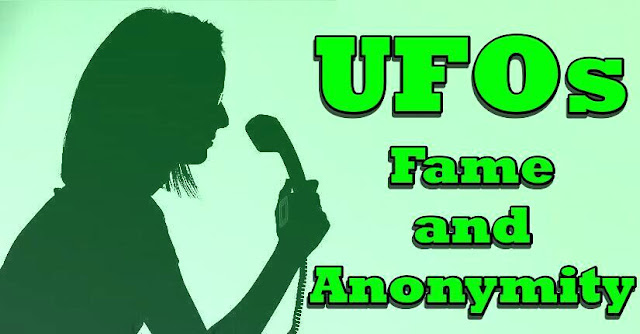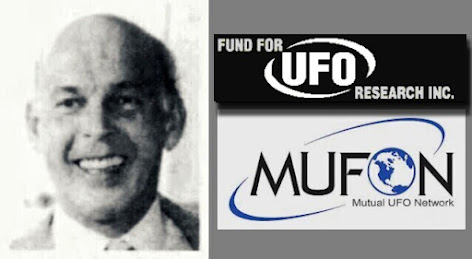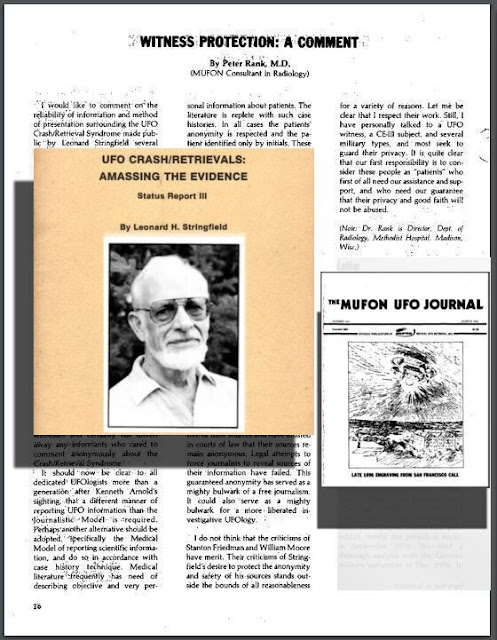Anonymity is a contentious issue in UFO research, drawing criticism for relying on unnamed witnesses, undisclosed sources, and the use of pseudonyms by authors and researchers. Then there is the UFO field’s long problem with the many types actively seeking attention, such as show business personalities, snake oil salesmen, cosmic televangelists, and hoaxers. Meanwhile, some sincere people who have had their name published have been subjected to ridicule, harassment, and the loss of their jobs. How can ufology seek truth and transparency while safeguarding the privacy of individuals?
Dr. Rank's Proposal
Dr. Peter Rank (1935-1988) was the Director of the Department of Radiology of the Methodist Hospital in Madison, Wisconsin. In the 1980s, he served on the board of the Fund for UFO Research (FUFOR) and as a medical consultant for the Mutual UFO Network (MUFON). Dr. Rank is perhaps best remembered for consulting on the famous 1980 Cash-Landrum UFO case in relation to Betty Cash’s medical issues. When the U.S. Army investigated the case, Col. George Sarran sought out to Dr. Rank for his thoughts. The documentation shows that Rank was interested in cooperating with the investigation, but he desired “no public attention” relating to the UFO case.
Leonard Stringfield’s work on UFO crash retrievals received much criticism for relying almost exclusively on anonymous witnesses. Dr. Peter Rank supported Stringfield’s work and defended him in an article in The MUFON UFO Journal, March 1982, page 16. The key portions discussing the issue of identity exposure are reproduced below.
Witness Protection: A
Comment
by Peter Rank, M.D.
For a generation now UFOlogists have been unconsciously assuming that "the Journalistic Model of reporting" is the one which demands the most credence. Information published in the media demand that such stories reveal the who, what, where, when, and why of the incident reported. It is assumed that such complete disclosure lends authenticity to the story involved and indeed is a requirement for believability. Most UFOlogists have adhered to this principle whenever possible. Such full disclosure according to the Journalistic Model has been counter-productive. In many cases, foreknowledge that their names would be published in the popular media has driven away UFO witnesses and certainly has driven away any informants who cared to comment anonymously about the Crash/Retrieval-Syndrome.
It should now be clear to all dedicated UFOlogists more than a generation after Kenneth Arnold’s sighting, that a different manner of reporting UFO information than the Journalistic-Model is required. Perhaps another alternative should be adopted, Specifically the Medical Model of reporting scientific information, and do so in, accordance with case history technique. Medical literature frequently has need of describing objective and very personal information about patients. The literature is replete with such case histories. In all cases the patients’ anonymity is respected and the patient identified only by initials. These case histories are never challenged on the grounds that the patients full name is not disclosed, and the underlying integrity of reporting is assumed as a matter of fact.
Might it not be useful for us to adopt a similar approach? Both witnesses and informants would thereby be protected. Witnesses could then report all their data to serious researchers with the clear knowledge that they and their families would never be identified in any publication which might provoke the popular media to descend upon them like locusts at a feast. Informants, many of whom are discussing information that is highly classified, perhaps several levels above the well known Top Secret category, may then feel free to "go public" with their information" without fear of retribution. This would encourage others to come out of the closet, and allow considerably more information to develop about the Crash/Retrieval Syndrome.
There is obvious journalistic precedent for this practice. Journalists are, and always have been, very protective of their sources and have insisted in courts of law that their sources remain anonymous. Legal attempts to force journalists to reveal sources of their information have failed. This guaranteed anonymity has served as a mighty bulwark of a free journalism. It could also serve as a mighty bulwark for a more liberated investigative UFOlogy.
…I have personally talked to a UFO witness, a CE-III subject, and several military types, and most seek to guard their privacy. It is quite clear that our first responsibility is to consider these people as "patients" who first of all need our assistance and support, and who need our guarantee that their privacy and good faith will not be abused.
Dr. Rank had those privacy concerns for himself. In 1983, Florida journalist Billy Cox interviewed him his analysis of the Cash-Landrum case for the Dec. 4, 1983, edition of Today.: “The doctor’s credentials are impressive: head of the radiology department at a major Midwestern university, a former medical school teacher and a former Army flight surgeon.” Rank didn't want his name published, and said:
“I'm not afraid for my reputation that is not the issue. The issue is, this whole UFO business attracts all sorts of psychiatrically marginal people. And then they get on the phone and they wanna waste your time and they call you during practice hours and all that garbage and I don't have time for that.”
The use of pseudonyms by legitimate researchers is not that an unusual practice in academic work. Their identity is generally shared with a few trusted colleagues, but not publicly shared, due to security or privacy concerns. As for government of industry whistleblowers, leakers etc., could be handled with the journalistic model for anonymity, where the source’s identity is known only by the author and at least one editor. The emphasis should not be on the name of the source, but on the veracity of the data.
 |
| From Col. Sarran's notes talking to Dr. Rank: "no public attention" |
The Missing Ingredient
Science, medicine, and journalism have professional standards. Ufology is mostly populated by amateurs with little or no oversight. As it is, no more trust can be put in anonymous sources than in the testimony of imaginary friends. Ufology must abandon its entertainment-based model and grow up and adopt an ethical code of professional conduct.
There is a place for anonymity in ufology exactly as Dr. Rank suggested decades ago. The identities of witnesses should be handled like those of patients in a scientific or medical study, where the data is shared, but not their identity and personal details. That would deny any charlatans and hoaxers the fame they seek. More importantly, it’d protect witnesses and encourage more people to speak openly their UFO sightings without the fear of exploitation or ridicule.
. . .
For Further Reading
Neuroskeptic. “Anonymity in Science.” Trends in Cognitive Sciences vol. 17,5, 2013: 195-6. doi:10.1016/j.tics.2013.03.004
Keerie, Catriona et al. “Data Sharing in Clinical Trials - Practical Guidance on Anonymising Trial Datasets.” Trials vol. 19,1 25. 10 Jan. 2018, doi:10.1186/s13063-017-2382-9
The New York Times: How The Times Uses Anonymous Sources, June 14, 2018



